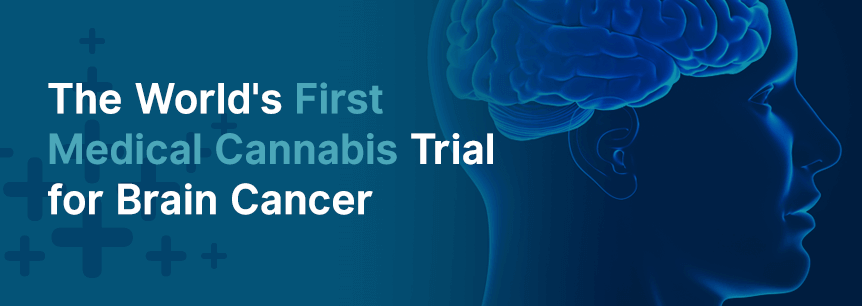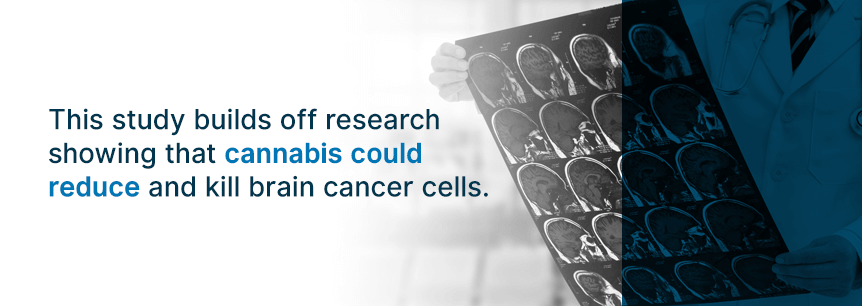
Australian researchers will conduct the world’s first clinical trial to examine cannabis and tumors. A team from Endeavour College of Natural Health plan to investigate whether marijuana medicine helps brain cancer patients. If they find positive results, we could move one step closer to confirming marijuana’s status as medicine. Find out more about the study and the relationship between cannabis and brain cancer.
A patient has less than a one percent chance of developing brain cancer in their lifetime. When they do receive a diagnosis, the symptoms have dangerous implications. Brain cancer symptoms include:
The survival rates of brain cancer vary by tumor type and age. We believe that regardless of diagnosis, every patient deserves a chance at survival. Research indicates that cannabinoids, the healing components of marijuana, could help us reach this goal.
The Endeavour College team will look at medical marijuana’s effects on glioma, a common type of brain tumor. A glioma appears in the glial cells that surround nerve cells and assist with function. According to the researchers, gliomas are aggressive and resistant to traditional treatments. So, they want to discover if cannabis medicine could work as a new therapy for these tumors. Positive results will lead to establishing dosage guidelines and potentially changing patients’ lives.
This trial’s researchers also want to see if the cannabis treatment improves the patients’ quality of life. Common brain cancer symptoms include nausea and headaches, which seem to respond to medical marijuana. Finding beneficial effects for both tumors and other symptoms would make medicinal cannabis a powerful cancer therapy.
For three months, 82 patients who meet selection criteria will receive medicinal cannabis treatment. They will take a liquid form of medical marijuana with high tetrahydrocannabinol (THC) content. THC is one of the two prominent cannabinoids studied for medicinal purposes. The patients will use cannabis medicine as a complementary treatment to their traditional cancer therapies. During the study period, the Endeavour researchers will monitor the patients’ symptoms. After the study, they will also follow up with the patients for up to two more years.
This study builds off research showing that cannabis could reduce and kill brain cancer cells. Studies find that cannabinoids like THC may induce apoptosis, or natural cell death, in gliomas. Cancer happens when malignant cells don’t die off on their own. So, this means cannabis could enhance the body’s ability to get rid of cancer. Research also demonstrates it could reduce tumors’ ability to make new blood vessels and receive nutrients. Cannabidiol, the second prominent cannabinoid, could hinder brain tumor growth.

The evidence we have on cannabis and tumors comes from preclinical trials, or studies that don’t involve living humans. Preclinical research examines isolated cells or involves animal subjects to find preliminary evidence that justifies researching with humans. Once we discover that a treatment doesn’t have dangerous effects during this research phase, we can move on to human subjects. Now that we have plenty of preclinical evidence, we can investigate cannabis’ healing properties in practice.
Anecdotal and clinical evidence demonstrates that medical marijuana alleviates common cancer and chemotherapy symptoms. Patient testimonials and high-quality research show it can relieve chronic pain, including the headaches brain cancer causes. Cannabis also reduces the frequency and severity of seizures, a symptom experienced by many brain cancer patients. Patients undergoing frequent and severe nausea from chemotherapy also find relief in medicinal marijuana.
The researchers conducting this study have extensive experience working with natural remedies and brain cancer treatment. Lead researcher Dr. Janet Schloss dedicates her work to discovering adjunct therapies for cancer treatment. She has 19 years of experience conducting clinical trials in oncology and complementary medicine. Her team will work with Associate Investigator Dr. Charlie Teo, who is well-known in Australia for his work in neurosurgery and received the Australian of the Year award for his work.
Endeavour College of Natural Health is the largest natural medicine university in the Southern Hemisphere. They have a robust research department dedicated to finding alternative remedies using evidence-based approaches.
The field of cannabis medicine has little clinical research. This is because in the United States, federal law interferes with getting approval for medicinal marijuana research. Other parts of the world have better access to marijuana for study purposes. However, medicinal cannabis research is about 50 years old, making it a newer field. It began in Israel in the 1960s, and the country acts as a cannabis knowledge center today. We need more clinical evidence to use medical marijuana to its fullest potential.
This trial’s results could bring us closer to a substantial body of evidence surrounding marijuana and cancer. Scientific knowledge consists of data from different studies that build on each other like building blocks. The Endeavour team’s findings will contribute to our understanding of medicinal cannabis and let us know what step to take next.
Do you have a glioma and live in Australia? You may qualify to take part in this trial. The official news article does not state the full criteria for participating in the study. But, it does provide contact information to help you find out. Email trials@endeavour.edu.au or call 07 3253 9582 to learn more about becoming a subject.
At MarijuanaDoctors.com, we aim to give you comprehensive updates on the state of cannabis medicine worldwide. Visit our blog to discover more news and advice about medicinal marijuana. Our international resources for patients in Australia will teach you about the country’s laws and treatment options. Let us help you feel empowered to get the most out of your marijuana medicine.
No Information on MarijuanaDoctors.Com should be used to diagnose, treat, prevent or cure any disease or condition. You can view our Full Disclaimer here.